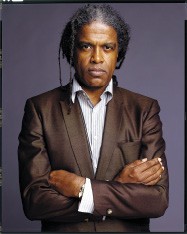The Indie Memphis Film Festival kicks off its second decade this week, as the 11th annual festival screens more than 100 films across seven days at Malco’s Studio on the Square theater, bringing such notable film names as former New York Times critic Elvis Mitchell, Hoop Dreams producer Peter Gilbert, and actor/filmmaker Giancarlo Esposito to town.
It’s the first Indie Memphis to be helmed by Erik Jambor, who was hired in the spring to be the festival’s first executive director.
“Things are coming together well,” Jambor says, with less than a week to go before the festival launches. “We’re excited about what we’ve got.”
This is the third film festival Jambor has led after co-founding the Sidewalk festival in Birmingham and spending a year running the BendFilm festival in Oregon.
“For me, it’s been about learning a new community and meeting people who have already been involved, so it’s a transition year in a way,” Jambor says. “I think we have a good shape to everything. I think it’ll be a good indicator of where we’re going to take things in future years. Hopefully, we can get people excited about independent film on a different level than they have been.”
The bones of this year’s festival will be familiar to past attendees: Low-profile regional and local films will compete in feature, documentary, and short categories while being supplemented by higher-profile “showcase” films screening out of competition. Under-the-radar international cinema will screen via the Global Lens series, and local musicians and filmmakers come together in a Music Video Showcase sponsored by Live From Memphis.
“We’ll probably tweak things as we go, but for this year I wanted to leave things pretty similar,” Jambor says. “The call for entries needed to get up as soon as possible, and it was easiest to keep a similar pattern.”
The biggest change to this year’s festival is scheduling. Indie Memphis will use all five screens at Studio on the Square Friday to Sunday, October 10th to 12th, and will pack all competition films into that block.
“We’re front-loading the event, so the weekend is really when the festival is most festive,” Jambor says. “Most of the films running are getting a screening that opening weekend. It lets us focus the energy and excitement.
“Even if you don’t know specifically what you want to see, you can come down that weekend and we’ve got all five screens going, so there are always a good number of options to choose from. I think that will give us the level of energy we’re looking for.”
That energy will include some high-profile films and filmmakers. Mitchell, a former film critic, and Gilbert, who shot and co-produced the landmark documentary Hoop Dreams, will serve on the festival’s juries for features and documentaries, respectively, but will also be in town to present their own work.
Mitchell produced and conducted interviews for The Black List, a documentary series of portraits of accomplished African Americans. Gilbert’s At the Death House Door is a documentary about a Texas death-row chaplain.

Elvis Mitchell
“I’d met Elvis Mitchell a few times at various festivals and ran into him at South by Southwest this past year and talked to him about Memphis,” Jambor says. “He’d never been and was interested in coming. Through that dialogue, we decided to run The Black List as well. It’s already run on HBO, but a lot of people don’t have HBO, so it was a good opportunity.”
Mitchell also will conduct interviews with Memphis filmmaker Craig Brewer and actor/filmmaker Esposito, whose Gospel Hill will screen at the festival. Esposito’s film has a strong local connection via Brewer collaborator Scott Bomar, who worked on the film’s score and soundtrack.
Monday to Thursday, October 13th to 17th, the festival will shrink to two screens at Studio and will mix a few “tentpole” screenings with encore presentations of festival award winners or films that drew particularly well. The full Monday to Thursday schedule will appear on the Indie Memphis website by Monday morning, after awards are presented Sunday night.
Another change this year is less fidelity to the festival’s “Soul of Southern Film” niche.
“That’s still an angle — maybe the main throughline — but we didn’t want to use that to exclude things,” Jambor says.
“I think Southern filmmaking ties into the larger concept of regional filmmaking, and I wanted to be able to find things like The New Year Parade or My Effortless Brilliance, which are very regional as well. That way, we can connect a filmmaker from Philadelphia, like Tom Quinn of New Year Parade, to a filmmaker from Memphis, like Morgan Jon Fox. If you read about the mumblecore movement that [Memphis filmmaker] Kentucker Audley is a part of, a lot of those filmmakers met each other on the film festival circuit. I didn’t want to limit those kinds of potential connections.”
One odd element of this year’s festival is the relative paucity of “hometowner” features, with only two local narrative features in competition: Fox’s OMG/HaHaHa and Brian Pera’s The Way I See Things. Additionally, there are two local documentaries: Brett Hanover’s Bunnyland and Joann Self’s The Arts Interviews: A Compilation.
Jambor says the scant number of local features and docs this year was not a programming decision: “It’s cyclical, I think. We have a good number of short films, but we didn’t get many features.”
Though there are several local filmmakers with feature projects in various stages of development or production, Fox suggests the slim Memphis representation is a result of a comedown from the Hustle & Flow effect: “For a while there, everyone thought they were going to be the next Craig Brewer, then people realized how hard it is [to make films].”
Those local filmmakers who do have work in this year’s festival will be competing on a different plane than in the past: Though the festival has kept its “Hometowner” competition, it also is allowing local films to compete in the general categories this year.
“We’re proud of the films we’re running — a lot of which have never played in the South,” Jambor says. “There are a lot of regional premieres. It’s exciting to be in the position of putting Memphis on the front edge of some of this stuff, to see movies that haven’t just not played Memphis, but haven’t played Nashville or Atlanta or Birmingham yet.”
For a full Indie Memphis schedule and information on tickets, go to indiememphis.com.
For additional Indie Memphis coverage, see memphisflyer.com throughout the festival.
